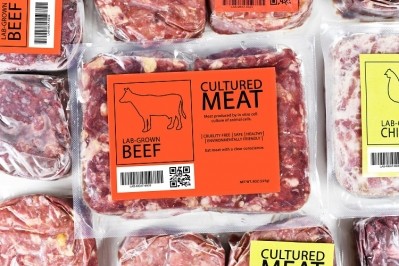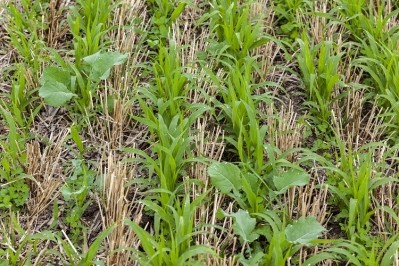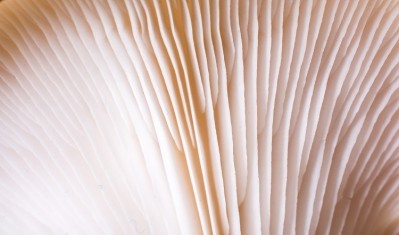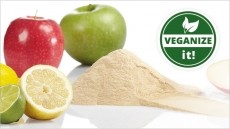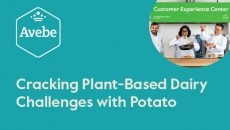Packaging pitches: Meet the start-ups rethinking plastic with fungi, algae and grains

Plastic pollution is a global concern, with an estimated eight million tonnes entering the marine environment every year. By 2050, there could be more plastic in the ocean than fish.
Can we innovate our way out of the plastic problem? The next wave of packaging pioneers thinks so, and they’re using unlikely materials – from fungi to algae and grains – to do it.
At our third annual Climate Smart Food digital event, running 19-21 September, we’ll hear from pioneers in the alt plastic space as their pitch their innovations. Registration for the free-to-attend digital summit is now open.
Replacing plastic with mycelia
Israeli start-up MadeRight is leveraging fungi fermentation technology to develop more sustainable packaging. At Climate Smart Food, co-founder Rotem Cahanovitc will explain how the start-up is upcycling industrial organic side streams from the food, agriculture and biotechnology industries into biomass, which is then mixed in with plastics (either fossil-based or bioplastics), for packaging manufacture.
Edible coffee cups
Bulgarian business Cupffee is making coffee cups from oats and wheat. Join Gergana Krusteva, marketing director at Cupffee as reveals how single-use coffee cups can be substituted for ‘sustainable edibles’.
Krusteva says: Consumer waste, particularly single-use plastics, has escalated over the 20th century, causing severe environmental consequences such as air and water pollution, resource depletion, and biodiversity loss. Despite common misconceptions, paper cups aren't sustainable alternatives as they contain plastic linings and their production involves deforestation and substantial energy usage. Cupffee, however, offers an innovative and eco-friendly solution to this problem. Formed from seven natural ingredients, these edible, vegan cups enhance the coffee experience while reducing waste. Their production process creates zero waste, even using excess material to make stirrers. With a global presence and partnerships with top coffee brands, Cupffee aims to challenge current assumptions, change consumption habits, and inspire consumers to contribute to environmental change.
Less plastic, more seaweed
Notpla is a UK-based start-up making sustainable packaging from seaweed and plants. At Climate Smart Food, co-founder and co-CEO Pierre Paslier will pitch the start-up’s innovation: single use without the plastic waste. Notpla was recently in the news for its participation in the Earthshot prize. The company provided takeaway boxes lined with seaweed to serve up the ‘Earthshot Burger’.
Climate Smart Food will run from 2pm CET to 5pm CET from 19-21 September as we ask how the food industry can help drive a transition towards sustainable food sourcing, production, and consumption.
19 September: Climate Smart Sourcing
Ingredients are a major contributor to FMCGs’ carbon footprints, making sourcing practices crucial to meeting carbon reduction deadlines. But cultivation is not the only consideration: global supply chains are increasingly plagued by disruption and have long been linked to human rights violations. How can sustainability be embedded into global supply chains?
On Day 1 of Climate Smart Food, we’ll be asking how best to mitigate against supply chain disruptions linked to droughts, floods or war; what sustainability legislation means for food majors; and whether regenerative agriculture can truly save the day.
20 September: Climate Smart Production
Feeding growing populations within planetary boundaries means producing more, with less. How can food and beverage makers increase output with fewer natural resources? From making the switch to ‘green’ energy to implementing water saving strategies and rethinking packaging design, we analyse the initiatives decarbonising production.
On Day 2 of Climate Smart Food, we’ll be asking how food majors can decarbonise their direct emissions; where water inefficiencies are most prevalent and how reliance can be reduced; what the future holds for plastic-free packaging; and whether we should increase our focus on the blue economy for sustainable nutrition.
21 September: Climate Smart Consumption
Shoppers often say they want ‘greener’ food and drink, but don’t always act with sustainability front-of-mind. Addressing barriers to climate smart consumption will be key to achieving food system transformation. Consumer demand is also a crucial piece of the food tech puzzle, with pioneers banking on us innovating our way out of the climate crisis. Are Europeans hungry for lab-grown food?
On Day 3 of Climate Smart Food, we’ll be asking what impact brands have on discouraging food waste in the home; how sustainability credentials can best stand out on the shelf; whether European consumers are ready for cultivated meat and precision fermentation dairy; and what the future holds for alternative protein.
Join the conversation live between 19-21 September by registering for free here.

